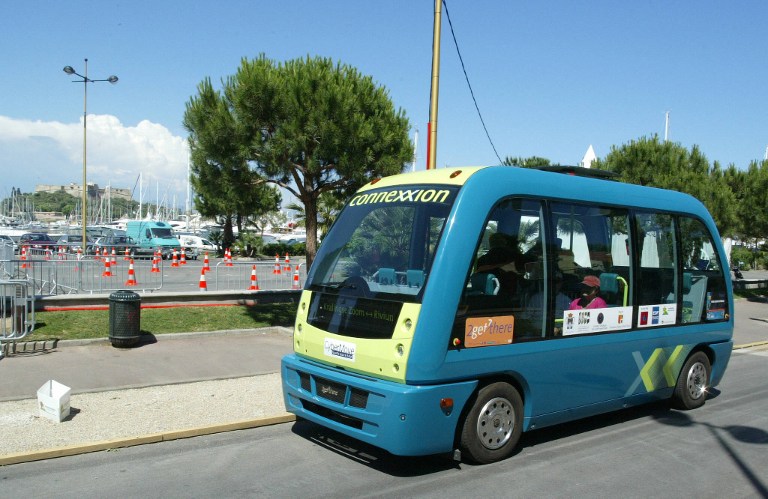Paris experiments with driverless buses

Passengers ride on the CyberCar in Antibes, southern France, 09 June 2004 where driverless minibus is being tested as part of the CyberMove project. The driverless minibus is a new form of public transport developed to improve the quality of life in cities by reducing use and parking needs of traditional cars as well as offering a cleaner and safer mode of transportation. The CyberCar travels at low speeds and follows a magnetized route. AFP
PARIS, France — Paris began its first experiment with driverless buses on Monday, with city officials saying they were eager to prepare for the coming “revolution” of autonomous vehicles.
Two box-shaped electric vehicles capable of carrying around 10 people have been deployed — within the safety of a special lane — on a bridge connecting two railway stations to the east of the city center.
“Autonomous vehicles represent a revolution for every city on the planet… which will change our urban environment and public space in a spectacular fashion over the next 20 years,” Paris deputy mayor Jean-Louis Missika told reporters.
READ: Uber launches groundbreaking driverless car service
The test unveiled Monday, which will last three months, is the first stage of the city’s embrace of self-driving vehicles which use a combination of lasers and cameras to detect other objects and people around them.
The head of the Paris transport network, Elisabeth Borne, said she envisaged the buses being used one day to connect homes and railway stations in the suburbs, which are served by overland trains known as RERs.
“We dream one day of having buses like these parked near RER stations which would come to collect passengers on demand,” she told reporters at the launch.
The advent of self-driving vehicles poses a series of regulatory, ethical and economic questions which policymakers will have to grapple with as the technology improves and grows more widespread.
One of them is: What happens to the humble bus driver?
“We need to start thinking from today about how to train drivers so they can shift into the new jobs created by autonomous vehicles,” Missika, who is a transport expert in the mayor’s office, told AFP.
In October, delivery drivers got an uncomfortable glimpse of the future when a self-driving truck built by Uber’s Otto unit successfully delivered a beer shipment.
Cars with some autonomous functions are already on our roads, and more than a dozen automakers including BMW, Kia, Volkswagen and General Motors are racing to get fully self-driving cars to market by 2020. CBB














